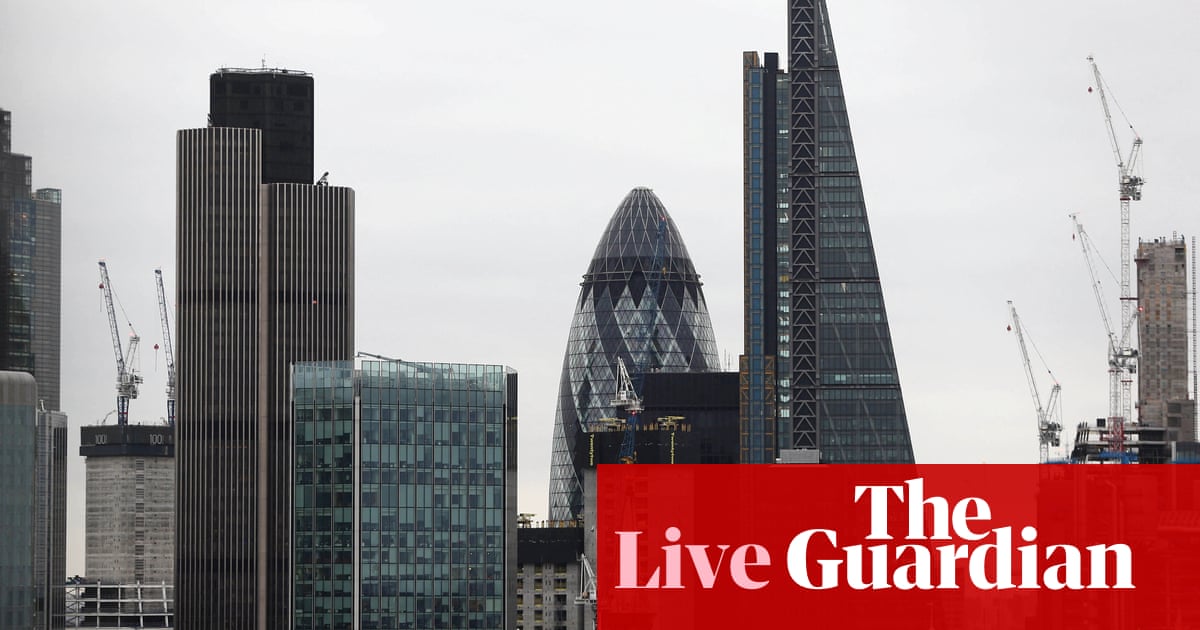UK economy returns to growth
Newsflash: The UK’s short, shallow, recession is over.
The UK economy grew by 0.6% in the first quarter of this year, the Office for National Statistics has reported.
That’s stronger growth than expected.
The ONS says the recovery was driven by the services sector, and industry:
-
In output terms, services grew by 0.7% on the quarter with widespread growth across the sector; elsewhere the production sector grew by 0.8% while the construction sector fell by 0.9%.
-
In expenditure terms, there were increases in the volume of net trade, household spending and government spending, partially offset by falls in gross capital formation.
This rise in GDP means that the economy is no longer in a technical recession, after activity fell in the third and fourth quarters of last year.
Key events
UK grew 0.4% in March
Growth in March alone was also stronger than expected.
GDP rose by 0.4% in March, the ONS reports, beating City forecasts for 0.1% growth.
The services sector had a good month, growing by 0.5% in March, while production output grew by 0.2%. Construction output fell by 0.4% in the month, though.
February’s GDP data has been revised higher too, to show growth of 0.2% (up from 0.1% first estimated).
UK economy returns to growth
Newsflash: The UK’s short, shallow, recession is over.
The UK economy grew by 0.6% in the first quarter of this year, the Office for National Statistics has reported.
That’s stronger growth than expected.
The ONS says the recovery was driven by the services sector, and industry:
-
In output terms, services grew by 0.7% on the quarter with widespread growth across the sector; elsewhere the production sector grew by 0.8% while the construction sector fell by 0.9%.
-
In expenditure terms, there were increases in the volume of net trade, household spending and government spending, partially offset by falls in gross capital formation.
This rise in GDP means that the economy is no longer in a technical recession, after activity fell in the third and fourth quarters of last year.
The problems with GDP
GDP is the standard measure of economic activity, but it has its critics too.
It tracks what’s happening across the economy, but does not distinguish between harmful and beneficial activity.
Back in 1968, US presidential candidate Bobby Kennedy issued a magisterial rebuke, saying GDP ‘measures everything except that which is worthwhile’.
Kennedy told the University of Kansas:
It counts special locks for our doors and the jails for the people who break them. It counts the destruction of the redwood and the loss of our natural wonder in chaotic sprawl.
It counts napalm and counts nuclear warheads and armored cars for the police to fight the riots in our cities. It counts Whitman’s rifle and Speck’s knife, and the television programs which glorify violence in order to sell toys to our children.
Yet the gross national product does not allow for the health of our children, the quality of their education or the joy of their play. It does not include the beauty of our poetry or the strength of our marriages, the intelligence of our public debate or the integrity of our public officials.
You can hear the speech here.
In order to measure GDP, statisticians use three approaches: measuring the total value of goods and services produced; the total amount spent in the economy, and the total amount of income from profits and wages.
All three methods should, in theory, give the same number.
The Bank of England is confident that the UK recession has ended.
Yesterday, the BoE said UK GDP is expected to have risen by 0.4% in the first quarter of this year, explaining:
UK GDP growth had strengthened since the start of the year, reversing the fall in output that was estimated to have occurred in the second half of 2023.
The [Monetary Policy] Committee expected the recovery in output to be underpinned by a pickup in household consumption, supported by higher real incomes.
Introduction: UK GDP report to show if economy has escaped recession
Good morning. We’re about to discover if Britain’s economy has clambered out of recession.
New gross domestic product (GDP) figures for the first three months of this year are released at 7am, and City economists are hopeful that the economy expanded in the quarter.
If so, that would mean that the shallow recession that began in the second half of last year has ended.
A technical recession, in City jargon, is at least two quarterly falls in GDP in a row. As things stand (and data are often revised…) the UK economy shrank by 0.1% in July-September 2023, and then by 0.3% in October-December as consumer spending slumped, triggering the technical recession declared earlier this year.
Analysts are expecting to learn that UK GDP rose by around 0.4% in the January to March quarter, which would consign the recession to history.
Recent falls in inflation, and hopes that interest rates will be cut this summer, are supporting the economy. Previous data has shown that GDP rose by 0.1% in February, and 0.3% in January.
Deutsche Bank’s chief UK economist, Sanjay Raja, says:
The UK economy likely shrugged off the short and marginal technical recession it fell into last year. After contracting by 0.3% q-o-q in Q4-23, we expect the economy to bounce back, expanding by 0.4% q-o-q in Q1-24 with March GDP rising by 0.1% m-o-m.
What’s driving the recovery? In short, some positive payback with household spending bouncing back to start the year. Government investment too will have likely supported GDP through the first quarter. And we think some build up in inventories will have also helped push GDP higher in Q1-24. In short, we expect Q1-24 to signal a sustained recovery back to trend growth.
Where to now? We expect 2024 GDP to expand by 0.5%. There are some upside risks to our projection, given the continued strength of business activity data.
The agenda
-
7am BST: UK GDP report for March, and the first quarter of 2024
-
7am BST: UK trade report for March
-
12.30pm BST: European Central Bank to release accounts of its last monetary policy meeting
-
3pm BST: University of Michigan’s survey of US consumer sentiment







